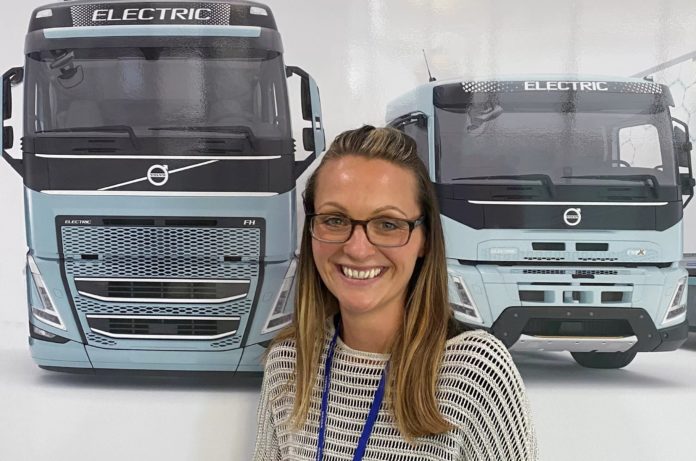Modern Fleet talks to Amy Stokes, head of e-Mobility, Volvo Trucks UK & Ireland about the wider benefits of switching to electric as well as the electrification of long-distance heavy transport
How important is electrification to Volvo Trucks?
We have invested in the development of a full range of electric trucks, with medium-duty trucks in production now and heavy-duty trucks to start production in September 2022.
What has been the reception from dealers and customers to electric trucks?
There’s naturally concern from some fleets over the higher cost of electric trucks versus conventional diesel vehicles, but we take a total cost of ownership approach when evaluating the investment in electromobility. This considers the wider benefits of switching to electric, including lower operating costs, the value of carbon reduction and the potential for our customers to develop a differentiated ‘green’ offer for their customers.
Meanwhile, the price of batteries is decreasing at a rate that’s outpacing most analysts’ expectations, which will help to bring costs down further as we scale production.
When will customers be able to trial electric trucks for themselves in the UK?
During the summer we’ve had an early production Volvo FM Electric in the country, attending shows and events, and next year we’ll be adding our first heavy-duty electric truck to our demonstrator fleet too.
How quickly do you expect to see operators shifting from diesel to electric for regional and multi-drop work?
As zero-tailpipe emission vehicles, electric trucks do not contribute any carbon or harmful emissions into the atmosphere during operation. This means they have great credentials for operation in inner-city locations where air quality and noise pollution challenges are at their highest. There are many operations that could perfectly adapt to electric trucks now and we don’t see that there’s any reason to delay. When we’re specifying trucks for customers, we carry out detailed simulations of their routes and operation to check that the truck can do the job it’s planned for and also to optimise the number of batteries required for the distance to be covered. We can also support our customers with the development of charging infrastructure at their sites to ensure that everything is considered.
Is the move to battery electric trucks not simply shifting from tailpipe emissions in our towns and cities, to greater pollution from fossil-fuel power stations in rural areas?
Whilst we’re in the midst of the decarbonisation transformation in the automotive industry, our energy industry is also well on the journey of decarbonisation, with the phase out of coal-fired power stations and the growth of renewable generation. Whilst the UK energy system isn’t fossil free, the contribution from renewables is increasing and this is set to continue with huge investment planned in off-shore wind power development.
Energy consumers can also influence the proportion of renewable energy consumed, by buying green energy and being considered in how and when they use it.
Pretty much any business can buy ‘green energy’ for charging their electric trucks back at base, remembering of course that it comes through the same grid as fossil-generated electricity. The slight green premium goes into investment for more renewable energy systems, and energy use is attributed to what’s currently going into the network from clean sources.
There’s also the opportunity to be more savvy around when energy is used. The ideal scenario is to charge electric vehicles when renewable energy is plentiful and/or energy demand is low, so you start to maximise the use of renewable generation assets and limit the times the national grid must rely on fossil fuel-generated supplies to meet demand. From 10pm onwards, as we start to go to bed, demand on the grid drops significantly which gives great alignment with an operation that wants to top up truck batteries overnight.
What about long-distance transport – electric won’t be suitable, will it?
If we look a few years ahead, electrifying long-distance heavy transport will be possible too.
What’s more, as demand for electric vehicles has increased, battery innovation has also been accelerating. Lighter, lithium-ion batteries are already about a third of the weight and half of the volume when compared to lead-acid and they are becoming even lighter and more powerful as the tech improves.
We are confident more gains can be made with the next generation of batteries, known as solid-state batteries. They charge faster, are safer and deliver up to twice the battery density of today’s lithium-ion batteries, which could potentially double the range of pure electric trucks.




